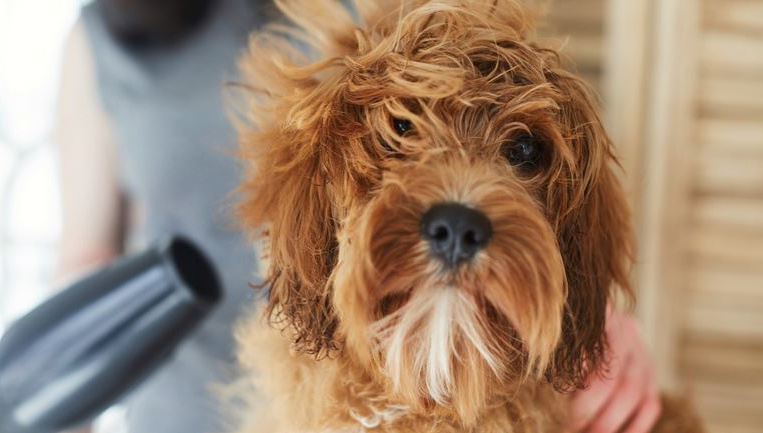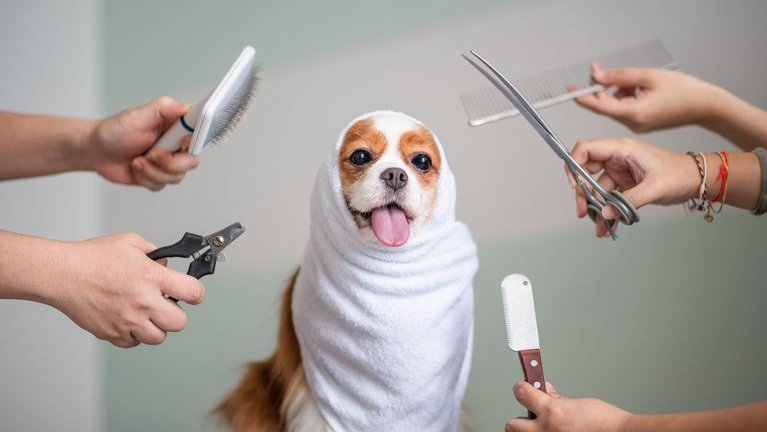How to groom your dog at home

Looking to save a little money by grooming your own dog at home? Here’s what you need to know before tackling this tricky task yourself.
How to groom your dog
Learning how to groom your dog isn’t just about making him look good. It also supports his overall health. But up with your pup’s grooming has been more challenging of late, due to coronavirus restrictions and led many of us to think about whether we can take it on ourselves (and save some money in the process). The good news is that you can groom your dog at home. As long as you have the right dog grooming supplies, such as gentle soaps, shampoos, and the best dog nail clippers, you can feel confident about taking matters into your own hands. Here’s what you need to know.
A little bit of at-home grooming goes a long way
Whether or not you take your pup to professional groomers, it’s important to regularly maintain at least some level of at-home grooming because it allows you to examine your pup for signs of problems you might otherwise miss. Good at-home grooming habits can make professional grooming easier for you, your dog, and your groomer, if and when you decide it’s time to return to the pet salon.
The secret benefit of grooming your dog
Regular grooming is a powerful tool in the battle against shedding, points out Matt Clayton, founder of Pet Hair Patrol, which is devoted to helping pet owners keep their homes clean. “Brushing, bathing and trimming will not only keep your pet’s coat healthy and looking good. It also helps remove the hair your dog has shed before it can make its way to the floor and your furniture,” Clayton says.
So, here’s how to groom a dog –safely, swiftly, and right in the comfort of your own home.
Start with a ‘consultation’
Approach this the way professional groomers do, suggests Lisa MacQueen, former dog groomer. Begin by evaluating what your dog needs. Are his nails clicking on the floor when he walks? If so, a nail trim is in order. Is he pawing at his eyes? It could be time for a fringe trim.

Set up your supplies
Depending on what your dog’s grooming will consist of, you’ll want to assemble some or all of these supplies:
Clean towels and washcloths.
Cotton balls.
Soap and shampoo specifically for dogs. MacQueen warns against using products meant for humans – or worse, for dishes – as these can be irritating to your dog’s skin.
A washbasin, sink, tub, or even a baby pool.
A breed-appropriate hairbrush. Long-haired dogs need pin brushes, which have long, round-ended stainless steel or chrome-plated pins, while short-, medium-, and some long-coated breeds need bristle brushes. There are also slicker brushes and curry combs for removing matted and dead hair, as well as smoothing the coat.
Clippers or scissors specially designed for dogs.
A dog-appropriate nail trimmer and styptic powder (which will stop the bleeding in case you make a mistake).
Your dog’s favourite treats and toys.
Wine or your favourite drink (for you, for when you’re finished).
Set the mood
Before you begin any grooming session with your doggo, take them on a nice, long walk to make sure they’ve done their business and feel all tuckered out. Plan to groom your dog in a contained area – for example, a bathroom, so that you can close the door. If your dog seems fearful, do your best to remain calm. Lavish love and treats on her, and try to keep the experience positive. If your dog seems particularly stressed out, that might mean giving up and trying again another day.
Doing your dog’s do
Regular brushing to remove loose hair will help to keep your pup’s coat – and your house – looking fresh. For longer, thicker hair, brush daily, advises MacQueen. For short hair, you can brush weekly. Not all dogs love getting their coats brushed, but no dog should cry or whimper during the process. So definitely be careful about combing through knots and mats.
“Go slow,” suggests dog salon owner Cindy Kelly, because this is an opportunity not only to remove the dead fur but also to stimulate the oils in your dog’s skin. Brushing is a good place to start your grooming session, adds veterinarian Jennifer Freeman. This is especially true if you’re planning on giving a bath, and even more so for long-haired dogs prone to tangles. Tangled hair can mat, which can turn bathing into a less-than-fun experience for both you and your dog.
The dreaded bath
Some dogs love water. Others… not so much. If your dog seems anxious, give lots of praise and encouragement, in addition to treats and toys, suggests Dr Freeman. Also make sure that the bathing space is large enough for your dog and that the water temperature isn’t too hot or too cold. If your dog won’t tolerate a tub-type bath, try a “sponge bath,” using a soft cloth to gently apply water and shampoo. Whichever method you choose, be mindful of your dog’s eyes; both water and shampoo can sting. Also, as soon as you’re done shampooing your dog, thoroughly rinse off any leftover soap. Not doing so can lead to dermatitis or “hot spots,” which is what Dr Freeman calls moist and infected lesions on your pup’s skin.
Although your dog will likely enthusiastically participate in the drying process with a series of full-body shake-offs, you should help him along. Towel him off, starting with his head, face, and ears and working your way down his body (feet last). Helping with the drying process is particularly important for dogs with heavier coats since damp spots in the undercoat can lead to those hot spots discussed above.
The kindest cut
Dog groomers tend to have diverging views when it comes to pet parents trimming their dog’s hair at home. Some believe that dog haircuts are best left to the professionals. Others think that you’re in the best position to decide if you’re capable of tackling an at-home trim for your canine companion. PetMD offers the following tips to do so safely.
Use professional shears or dog clippers (ideally, with a No. 10 clipping blade).
Use a professional-style grooming table, which can secure your dog during a haircut.
Start with dry dog hair, not wet. (Do your trimming after you brush, wash and fully dry your pup.)
Use only the tips of your shears to trim the feet, face and tail.
When trimming the ears, keep your non-cutting hand on the edge of the ear to ensure that you only cut hair and not skin.
If you’re dealing with a matted coat, use clippers, not scissors.
Try to avoid shaving your dog at home, but if you must, start with a dry, clean dog. Using a blade that isn’t dull, start around your dog’s neck and work your way down. Take even more care around the thin skin, such as where the limbs meet the torso (which can catch on the spaces between blades) and near the nipples (a female dog can have as many as ten).
And if you ever don’t feel comfortable, stop. There is no shame in deciding you’d be more comfortable if a professional tackled this task.
Eyes and ears
Using a moistened cotton ball (no soap), gently wipe your dog’s eye area to remove any debris or goo, MacQueen recommends. For the ears, use a warm, damp washcloth to wipe what you can see. Never use a Q-tip or other cotton swab to clean your dog’s ears: “The canal ear of a canine is longer/deeper than a human’s, but equally delicate, and improper techniques could lead to serious ear injuries and significant pain.” Some dogs need the hair plucked just inside the ear to keep air circulating. But you should only do this if your veterinarian discusses it with you first.
Photos: Reader's Digest
Written by Lauren Cahn
This article originally appeared on Reader's Digest
